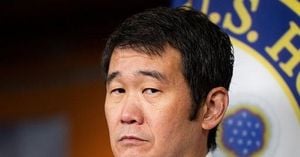Thousands of people took to the streets of Madrid on Sunday, February 23, 2025, to protest for public education under the rallying cry "Save Public Education." The demonstration attracted students, teachers, families, and unions, who were all united against what they described as years of budget cuts and privatization efforts undermining the education system.
According to organizers, around 100,000 individuals participated, filling the streets from Atocha to Puerta del Sol. This massive turnout underscored the urgent concerns within the community about the deterioration of public education funding and services. Ana, a secondary school teacher and spokesperson for the educational collective Menos Lectivas, stated, "The public education is fundamental for justice and dignity, and today we have seen it matters to many, whether they are part of the educational community or not." Her words echoed the sentiments shared by many demonstrators, who felt the current situation was intolerable.
For years, Madrid's educational financial support has lagged behind national averages. Recent statistics revealed, for example, the region spent approximately €5,886 per pupil annually on non-university education, significantly less than the national average of €7,043. Despite boasting the highest GDP per capita in Spain at €42,198, the region's investment in public education remains critically low, prompting calls for change.
One of the key issues raised during the protest was the heavy reliance on private education due to chronic underfunding of public institutions. Participants carried banners stating slogans such as "Education is a right, not a business" and "The public is not to be touched," reflecting fears of being forced to privatize educational services. Among the demonstrators was Yolanda Díaz, the Second Deputy Prime Minister and Minister of Labor. Díaz condemned the government's approach, saying, "There exists a brutal assault by the right on public education. Where they govern, there is massive destruction of this fundamental right."
Milika Babic, a teacher at José Luis San Pedro Institute, voiced skepticism about proposed educational reforms. "I don't believe my teaching hours will decrease from 20 to 19 as promised by the Education Council," she said, illustrating the distrust many educators feel toward government commitments. Teachers pointed out overcrowded classrooms with up to 29 students per class, far exceeding the ideal ratio recommended by UNESCO, which suggests 250 students per counselor.
Organizers expressed their frustration over budget stagnation since 2011, calling for the recovery of around 5,000 teaching positions cut during earlier austerity measures. The impact of these policies continues to be felt across all educational levels, contributing to the public's disenchantment. The rally featured various speeches, including calls to action from representatives of more than 20 collectives, labor unions, and political parties, emphasizing the theme of action against outdated educational policies.
Ricardo Marchán from UGT highlighted the necessity for immediate government intervention. "We demand firm commitments and concrete measures from the Community of Madrid to guarantee quality public education, so students have what they need, dignifying the teaching profession, and ensuring fair working conditions for all educational staff."
Political tensions were evident, particularly as representatives of the opposition parties, including PSOE and Más Madrid, reinforced the position against the president of the Community of Madrid, Isabel Díaz Ayuso. Manuela Bergerot from Más Madrid criticized Ayuso, claiming the government is complicit by allowing the commodification of public education. "We are not going to stop demanding what is just. We’ll continue to request adequate funding for public universities," she stressed.
Future mobilizations are already being contemplated. Menos Lectivas declared, "Today marks the beginning of everything. We will construct the public education we deserve, free and of quality." This sentiment of resilience was palpable among participants, many of whom expressed readiness to escalate their actions if their demands continued to go unaddressed.
The government rebuffed the protesters, with Emilio Viciana, the Minister of Education, claiming the demonstration was politically motivated and dismissing participants as "activists" seeking to undermine the government. Despite these accusations, the determination among the public and educators was evident.
Finally, the protest concluded, leaving many inspired and eager to continue the fight for equitable educational resources. The community's collective stance showcased not just their grievances but also their commitment to ensuring future generations receive the quality education they rightfully deserve.



